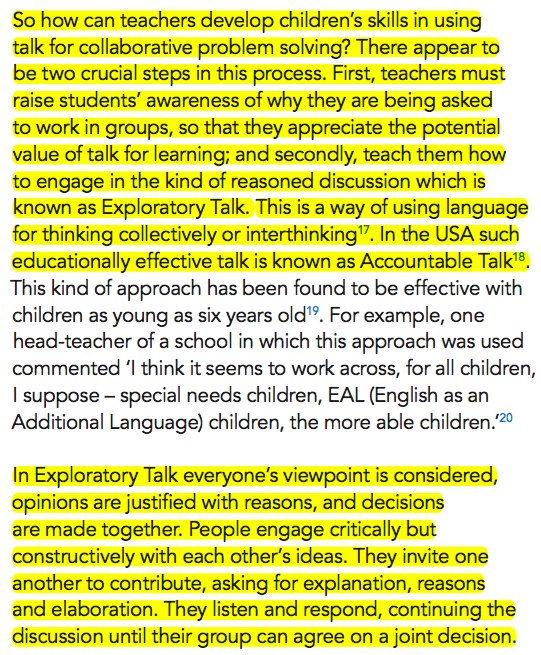Just finished, and thoroughly enjoyed, reading the @OracyCambridge paper 'The development of Oracy skills in school-aged learners' by @profneilmercer and @LynDawesMercer (ht @RethinkingJames). It outlines the 'why' of Oracy, breaks down skills, and... languageresearch.cambridge.org/images/Languag…
touches on teaching. It begins with an argument that explicit Oracy instruction provides a crucial 'second chance' for students. And relates the development of speech to the development of thought. 

Then breaks Oracy skills down into four categories, as presented in the Cambridge Oracy Skills Framework below. A clearer explication of the skills of Oracy I've not yet seen. 

It touches upon talk-focussed pedagogy for collaborative group work and public speaking, with a particular emphasis on 'Exploratory Talk' as a tool for interthinking (@cpaterso, this Exploratory Talk is what I mentioned at the conference earlier in the year). 

We then see some classroom transcripts, and are reminded of some of the questions that it's helpful for students to learn to ask. 

A section that I found particularly interesting was on developing listening skills. This is something I touched upon (in that I need to work on this) in thought shrapnel a few weeks ago (ollielovell.com/tot/071/#gtgtg…). 

I also have questions. For example, to what extent does the content domain impact the scope for the use of Exploratory Talk as a learning tool? Here are 'Talking Points' from the paper, but to me, it seems the English ones lend themselves much better to this than Science. 

This paper was a great primer. Can't wait to delve into this stuff more in 2019! What's the best resource for building my capacity to teach Oracy @profneilmercer ?
Here's the link again for anyone interested: languageresearch.cambridge.org/images/Languag…
Here's the link again for anyone interested: languageresearch.cambridge.org/images/Languag…
• • •
Missing some Tweet in this thread? You can try to
force a refresh














